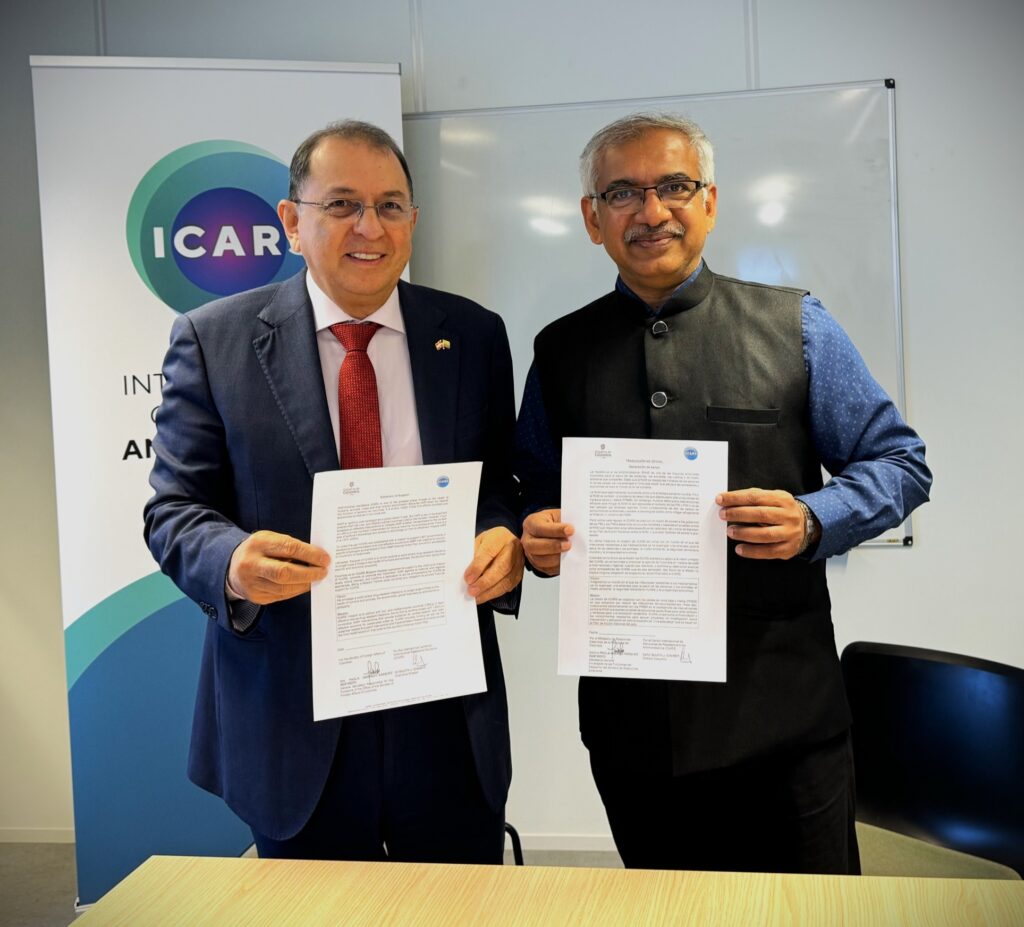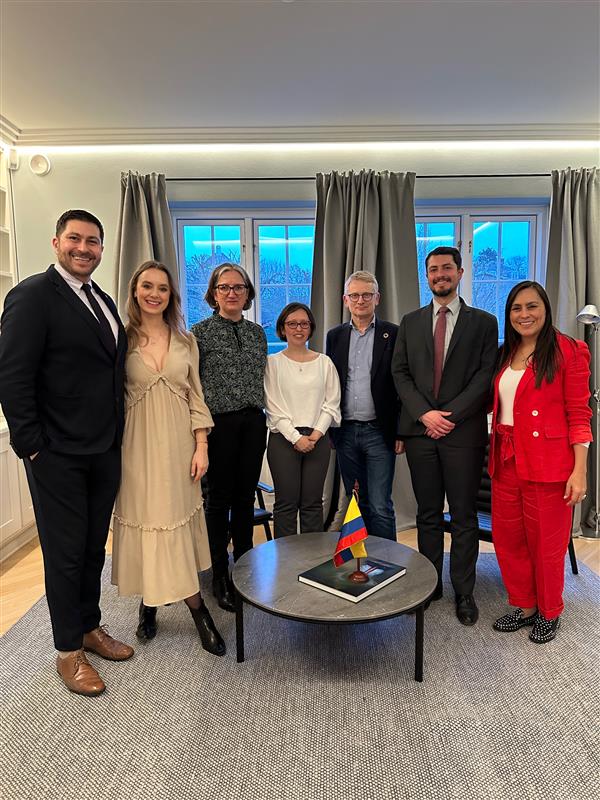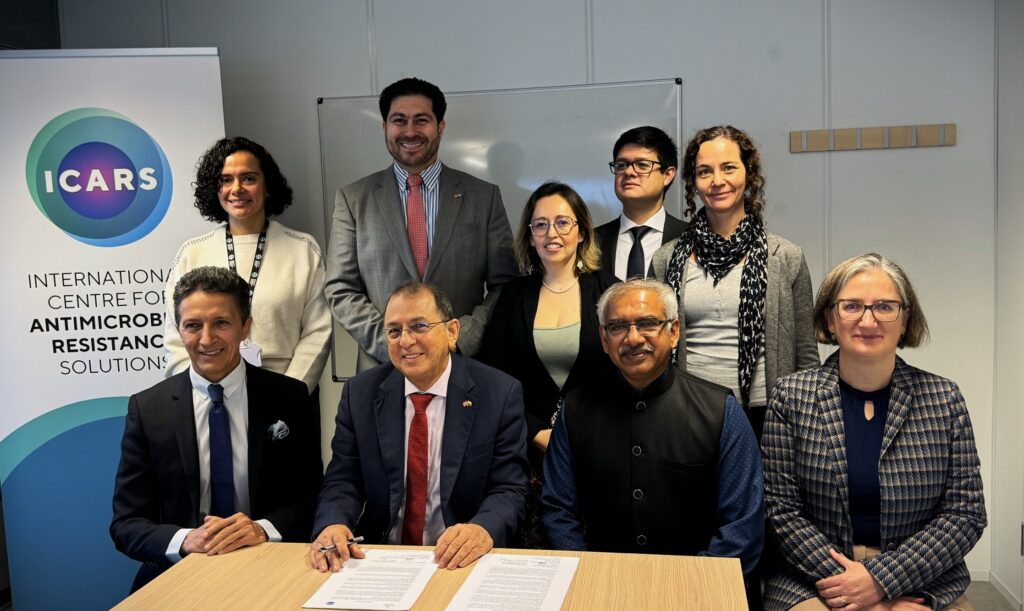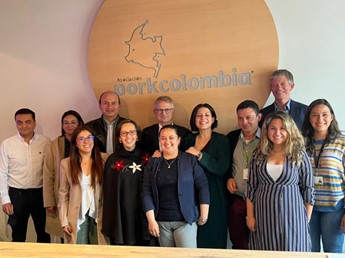Copenhagen, Denmark – November 19, 2024 – The International Centre for Antimicrobial Resistance Solutions (ICARS) is pleased to announce its new mission partnership with Colombia. This partnership marks an important milestone in ICARS’ mission to support Low- and Middle-Income Countries in developing tailored AMR solutions that align with national priorities and strategies. Colombia is the twelfth country to join ICARS’ growing network of Mission Partners, demonstrating its commitment to addressing AMR at a national and regional level.
The formal signing of this mission partnership took place on 19 November 2024 during a high-level meeting at ICARS’ headquarters in Copenhagen. The Vice Minister for Foreign Affairs of Colombia, along with other government representatives and colleagues from the Colombian Embassy in Denmark attended the event. The signing was followed by a presentation of a new AMR mitigation project supported by ICARS which will address transmission of bacterial pathogens of public health importance, such as Carbapenem-resistant Enterobacterales (CRE).

AMR in Colombia: Context, challenges, and progress
In Colombia, antimicrobial resistance, particularly the spread of CRE poses a significant public health challenge. The rapid dissemination of the blaKPC carbapenemase gene in these bacteria has made them endemic in the country. This has been exacerbated by the COVID-19 pandemic, which led to a sharp increase in CRE infections. The surge has highlighted the need for urgent, targeted interventions to control the spread of these resistant pathogens, especially in high-complexity public healthcare settings.
Colombia has taken proactive steps to address this issue. The National Antimicrobial Resistance Response Plan (NARRP), launched in 2018, has set the foundation for coordinated action across various sectors. In 2022, the Colombian Ministry of Health and Social Protection introduced a resolution focused on the prevention, surveillance, and control of Healthcare-Associated Infections (HAIs), as well as antimicrobial stewardship programs (ASPs). However, challenges remain, particularly in ensuring the consistent and effective implementation of these strategies across the country’s public healthcare institutions.
Mission Partnership: Advancing AMR mitigation efforts in Colombia
ICARS’ new mission partnership with Colombia represents a strengthened collaboration aiming at addressing these persistent AMR challenges. As a mission partner, Colombia joins ICARS in co-developing and implementing solutions that are specific to the country’s needs and healthcare context.
As an ICARS Mission Partner, the country will access ICARS’ network of research, policy, and technical support, facilitating closer and more strategic collaboration. Colombia will share its experiences and challenges with other countries facing similar AMR issues, helping to strengthen regional and global advocacy efforts. Through this partnership, Colombia reaffirms its commitment to addressing AMR and strengthening the resilience of its healthcare systems.

New collaborative project
As part of this partnership, ICARS will collaborate with Colombia on a new project aimed at reducing the spread of carbapenem-resistant Enterobacterales (CRE) in public healthcare institutions, particularly in Intensive Care Units (ICUs). The project, Developing a Multimodal Strategy to Decrease and/or Limit the Dissemination of Carbapenem-Resistant Enterobacterales (CRE) in Public Healthcare Institutions in Colombia, will begin in January 2025 and run through January 2028, with a total budget of USD 700,000.
This project, which will be led in collaboration with the Ministerio de Salud y Protección Social (Ministry of Health and Social Protection) and Universidad El Bosque, aims to implement a comprehensive Infection Prevention and Control (IPC) bundle programme in high-complexity public healthcare institutions. The programme will be designed to address the spread of CRE through a series of evidence-based interventions, including hand hygiene, patient hygiene, the use of personal protective equipment (PPE), CRE screening, and environmental disinfection.

The core of the project is a quality improvement methodology that aims to change the behaviour of healthcare workers in ICUs by improving their adherence to IPC strategies. Additionally, a qualitative study will be conducted to identify barriers and facilitators for the successful implementation and scale-up of the IPC bundles. An economic evaluation will also be carried out to assess the cost-effectiveness of the programme in reducing CRE infections and hospital costs.
Dr. Maria Virginia Villegas, MD, MSc, FIDSA, ESCMID fellow, head of the Antimicrobial Resistance and Hospital epidemiology (RAEH) research group at Universidad El Bosque is leading the research efforts. Dr. Natalia Restrepo Arbeláez, MD, MPH, will serve as the project coordinator. The project will not only provide valuable data for controlling CRE in Colombia but also contribute to the development of policies and best practices for AMR mitigation at a national level.
Looking ahead: Strengthening global AMR efforts
The partnership with Colombia reflects ICARS’ broader strategy of collaborating with countries to co-develop sustainable, context-specific AMR solutions. Alongside an upcoming project, ICARS and Colombia are working together on several key initiatives that build on the progress already underway in the country.
One such project focuses on reducing antimicrobial use in pig farming by improving colostrum provision and vaccination protocols for weaning pigs, in partnership with the Colombian Ministry of Agriculture and Rural Development, Porkcolombia, Universidad Nacional del Centro de la Provincia de Buenos Aires, and the Colombian Agricultural Institute (ICA). Another initiative, co-funded with the UK Global AMR Innovation Fund (GAMRIF) and recently concluded in March 2024, worked to address AMR through enhanced diagnostic uptake in pig farming, also in partnership with Porkcolombia. Additionally, ICARS is supporting FARM-CARE interventions, co-funded with JPIAMR, to control AMR in agriculture and further promote sustainable practices within Colombia’s agricultural sector.

Through this mission partnership, ICARS and Colombia are committed to enhancing the effectiveness of AMR interventions within and across One Health sectors, improving healthcare outcomes, and contributing to the global efforts to curb the rise of antimicrobial resistance.
ICARS extends its gratitude to Jorge Rojas, Deputy Minister of Foreign Affairs of the Republic of Colombia; Javier Higuera, Ambassador-designate of Colombia to the Kingdom of Denmark; Duvan Ocampo, Minister Plenipotentiary at the Embassy of Colombia in Denmark; John Quintero, First Secretary at the same embassy; and Alejandro Morales, Adviser to the Deputy Minister of Foreign Affairs of Colombia, for their valued contributions and support.

